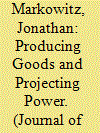| Srl | Item |
| 1 |
ID:
160481


|
|
|
|
|
| Summary/Abstract |
How does maintaining international primacy affect a hegemon's domestic political economy? Debates on hierarchy, retrenchment, and structural power in the global economy are dominating international relations, yet scholars pay limited attention to the second-image reversed consequences of America's global role. The three books under review begin to correct this deficit. Combining their insights uncovers the effects of power politics on an area of substantial public and academic interest: economic inequality. While rising inequality is surely a multicausal outcome, research across the social sciences pinpoints technological change and the financialization of the American economy as fundamental drivers of the recent “redistribution.” These two shifts are generally treated as exogenous shocks in our models; the causal logics of the works under review illustrate that hegemony is the underlying, endogenous force. The analysis indicates a need for political scientists to study the interaction of international and domestic politics as a dynamic process, which would be bolstered by borrowing historical institutionalism's analytic toolkit. Investigating feedback loops and sequencing across both levels of analysis and across issue areas that are currently studied in isolation indicates an agenda that will better integrate security and political economy scholarship.
|
|
|
|
|
|
|
|
|
|
|
|
|
|
|
|
| 2 |
ID:
167368


|
|
|
|
|
| Summary/Abstract |
How does a state’s source of wealth condition the domain in which it seeks to project influence? We argue that what a state makes conditions what they take. Specifically, the less states rely on land rents to acquire wealth, the less interested they will be in seeking control over territory and the more interested they will be in securing access to distant markets. We develop and test several observable implications that should follow whether this proposition is true. First, as states become less economically dependent on territory, they should be less likely to fight over territory; second, those states should be more likely to both invest in power projection capabilities and subsequently project power at greater distances. Our findings support our theory. These results are robust across a variety of model specifications that take into account potential confounds, such as regime type, economic development, threat, and geography.
|
|
|
|
|
|
|
|
|
|
|
|
|
|
|
|